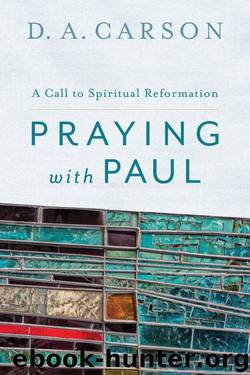Praying With Paul: A Call to Spiritual Reformation by D. A. Carson

Author:D. A. Carson
Language: eng
Format: mobi
Tags: Spirituality, Religion & Spirituality, Prayer
ISBN: 080109710X
Publisher: Baker Academic
Published: 2015-01-12T22:00:00+00:00
Paul Prays for What Is Excellent
At one level, one could say that what Paul is asking God for is constantly increasing love: “And this is my prayer,” he writes, “that your love may abound more and more in knowledge and depth of insight” (1:9). But as one reads on, it becomes clear that, at least in this prayer, the love for which Paul prays is not an end in itself but a means to an end. Paul tells the Philippians that he prays that their love may increase “so that [they] may be able to discern what is best” (v. 10).
So although Paul is here praying that the Philippians’ love may increase, that petition is so tightly cast with a different end, namely, that they may discern and approve what is best, that it is no less fair to say that Paul is praying for what is best, for what is excellent. We have not yet unpacked exactly what these excellent things are; nor have we explored how an increase in love moves the church toward the goal of approving these excellent things, the best things. What is immediately clear, however, is that Paul’s prayer spells the death of entrenched mediocrity, of smug self-satisfaction, of contentment with our own excuses. Paul prays for what is excellent.
Paul does not expect excellence to be dropped on the church in a package. He prays that believers may discern and approve what is best, that is, that they may experientially test and thereby approve1 what is best. But what are these distinguishing things, these excellent things for which Paul prays?
Three clues in the text help us to answer that question. First, Paul assumes that if the Philippians are going to discern and approve what is best, their love will have to “abound more and more in knowledge and depth of insight.” That is why he prays for such love. The excellence he wants the Philippian believers to pursue is not easily discerned. To discern and approve what is excellent, Christians must be characterized by this abounding love.
Why does Paul describe Christian love in exactly this way? Love that “abounds more and more” is plain enough, but what about love that “abounds more and more in knowledge and depth of insight”? Perhaps we will get at Paul’s point rather quickly if we replace the phrase with the opposite qualities. Paul does not pray that their love might “abound more and more in ignorance and insensitivity” or in “stupidity and ham-fistedness” or in “cheap sentimentality and myopic nostalgia.” He prays, rather, that their love might “abound more and more in knowledge and depth of insight.” The ever-increasing love for which Paul prays is to be discriminating. It is to be constrained by “knowledge” and “depth of insight.” Without the constraints of knowledge and insight, love very easily degenerates into mawkish sentimentality or into the kind of mushy pluralism the world often confuses with love. Christian love will be accompanied by “knowledge”—that is, in Paul’s use, that
Download
This site does not store any files on its server. We only index and link to content provided by other sites. Please contact the content providers to delete copyright contents if any and email us, we'll remove relevant links or contents immediately.
| Guides | New Testament |
| Old Testament |
The Five People You Meet in Heaven by Mitch Albom(2859)
Name Book, The: Over 10,000 Names--Their Meanings, Origins, and Spiritual Significance by Astoria Dorothy(2505)
Real Sex by Lauren F. Winner(2496)
The Holy Spirit by Billy Graham(2439)
The Secret Power of Speaking God's Word by Joyce Meyer(2266)
How The Mind Works by Steven Pinker(2239)
0041152001443424520 .pdf by Unknown(2238)
ESV Study Bible by Crossway(2170)
Ancient Worlds by Michael Scott(2118)
The Meaning of the Library by unknow(2081)
The Gnostic Gospels by Pagels Elaine(2046)
Churchill by Paul Johnson(2023)
The ESV Study Bible by Crossway Bibles(1987)
MOSES THE EGYPTIAN by Jan Assmann(1984)
Jesus by Paul Johnson(1900)
Ancient Near Eastern Thought and the Old Testament by John H. Walton(1860)
The Nativity by Geza Vermes(1858)
The Complete Dead Sea Scrolls in English (7th Edition) (Penguin Classics) by Geza Vermes(1854)
City of Stairs by Robert Jackson Bennett(1848)
